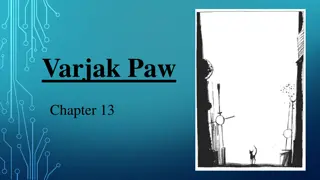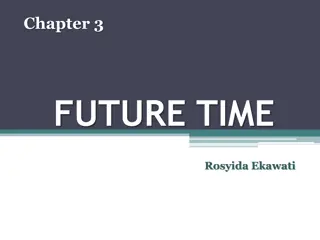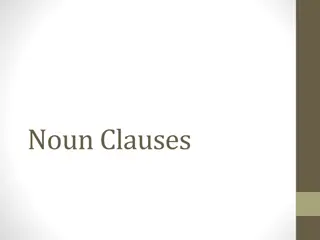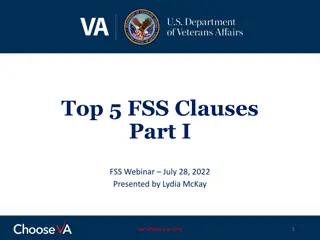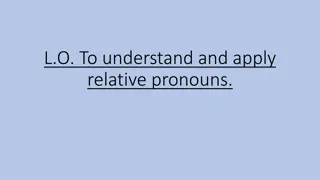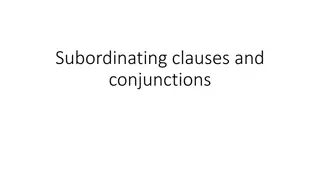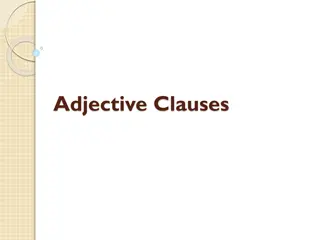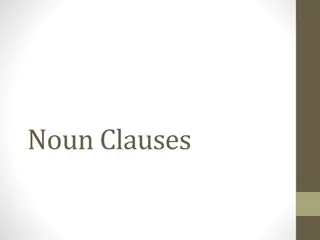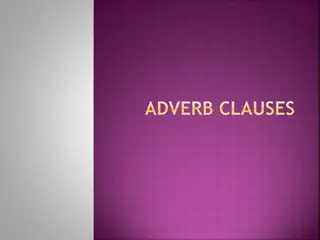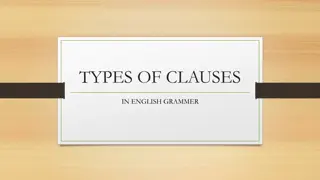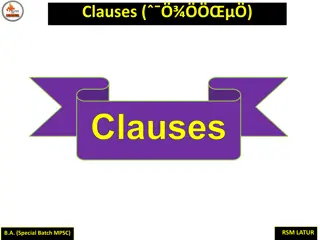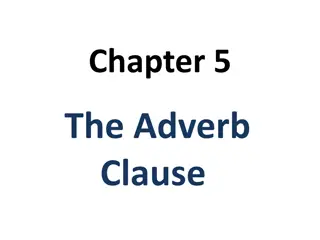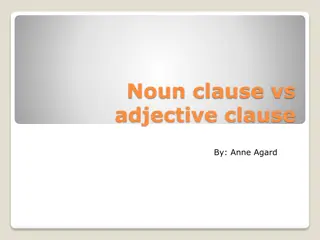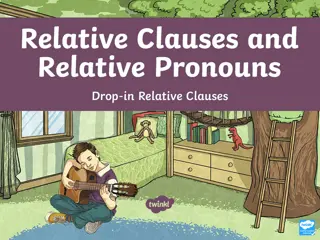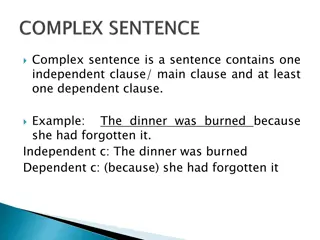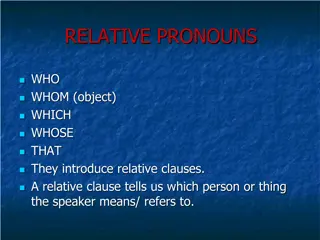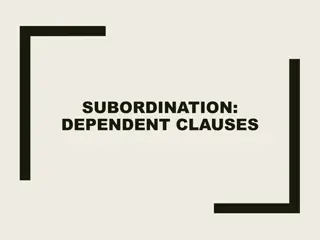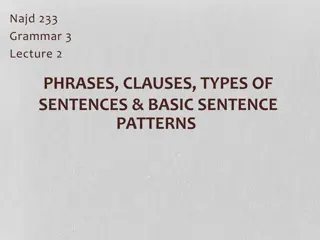Mastering Relative Clauses in Writing
Enhance your writing skills by mastering the use of relative clauses to draw inferences about characters' feelings, thoughts, and motives. Learn how to add extra information to sentences using relative clauses beginning with who, which, where, when, whose, that, or an omitted relative pronoun. Explore examples and practice adding relative clauses to sentences for improved clarity and depth.
Download Presentation

Please find below an Image/Link to download the presentation.
The content on the website is provided AS IS for your information and personal use only. It may not be sold, licensed, or shared on other websites without obtaining consent from the author.If you encounter any issues during the download, it is possible that the publisher has removed the file from their server.
You are allowed to download the files provided on this website for personal or commercial use, subject to the condition that they are used lawfully. All files are the property of their respective owners.
The content on the website is provided AS IS for your information and personal use only. It may not be sold, licensed, or shared on other websites without obtaining consent from the author.
E N D
Presentation Transcript
DIARIES YEAR 5
Learning objectives Draw inferences (characters feelings, thoughts and motives) Use relative clauses beginning with who, which, where, when, whose, that or an omitted relative pronoun
Relative Clauses Relative clauses use a subordinate clause to add extra information to a sentence. The information in the subordinate clause is relevant to the information in the main clause. For example: The boy walked to the shops. Becomes: The boy, who had just received his pocket money, walked to the shops.
Add your own relative clauses Can you improve the following sentences by adding a relative clause? 1. The bear rolled down the hill. 2. The boy ate a sandwich. 3. A car pulled away from the curb. 4. A giraffe ate some leaves. 5. The moon shone on the water.
Listen to Michael Rosens advice on writing a diary entry HTTPS://WWW.YOUTUBE.COM/WATCH?V=RE0PCQUZU9W
You have written diary extracts in school before. Can you remember as many of the features of a diary entry as you can? What do I need to include when I write a diary entry? A diary entry is a recount so look at the slides about Reggie the Recount Reindeer and add any features that you may have forgotten. There is another Powerpoint just about how to write diaries so look at that too.
WRITING A RECOUNT I retell events. I was there. I saw everything! Meet Reggie the Recount Reindeer Click on the coat of arms to go to Warrington Council's website
LETS REVIEW TEXT STRUCTURE Text structure Setting the scene: who, when, where, what. What happened? Time (chronological) order. Closing statement Language features Past tense Time adverbs First person writing Focus on specific people, including writer Click on the coat of arms to go to Warrington Council's website
LETS REVIEW TEXT STRUCTURE Remember this writing shape. It reminds me of my antlers! Click on the coat of arms to go to Warrington Council's website
HINTS Use the timeline to keep things in chronological order. This means in time order: (this happened, then that happened). Remember the purpose of your writing and who you are writing it for. You can use the lines on the writing shape to help plan your paragraphs. Click on the coat of arms to go to Warrington Council's website
THIS IS WHEN YOU CAN USE MY RECOUNT: Letters Autobiography Diary Journal Newspaper report Magazine article Write up of a trip or science experiment Click on the coat of arms to go to Warrington Council's website
TIME ADVERBS At first Then Much later in the day Soon afterwards Meanwhile Next Finally Several weeks later After a while Click on the coat of arms to go to Warrington Council's website Reggie has given you great ideas for time adverbs. Make sure you use some of them in your work!
MY RECOUNT CHECKLIST I HAVE USED: PAST TENSE CHRONOLOGICAL ORDER WRITTEN IN FIRST OR THIRD PERSON NAMES PEOPLE, PLACES OR THINGS ADVERBIALS FOR WHEN A GOOD OPENING PARAGRAPH TO EXPLAIN WHO, WHAT, WHERE, WHEN, WHY MY WORK IMPROVES IF I REMEMBER TO USE: POWERFUL VERBS QUOTATIONS DIFFERENT SENTENCE LENGTHS DIFFERENT SENTENCE OPENINGS QUESTIONS AND EXCLAMATIONS LINKS BETWEEN MY LAST LINE AND THE INTRODUCTION Have you informed and entertained the reader? Click on the coat of arms to go to Warrington Council's website
Planning You are going to be planning a diary entry. You could write about a day that you have had during lockdown. It could have been a good or a bad day. You could write as if you are a character from one of your favourite books or pretend to be an historical figure. You might even write a diary as if you were Boris Johnson for a day! Put each new event into a new paragraph.
Writing activity Now, have a go at writing your own diary entry. Re-read your writing once you have finished and check that your writing makes sense, that you have punctuated correctly and there are no spelling mistakes.
Publishing Have a go at publishing your diary entry. Make sure that you use your neatest handwriting. Why don t you decorate your page too?


